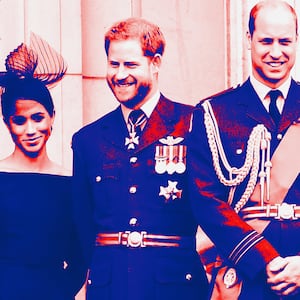When Prince Charles brutally elbowed his brothers, Andrew and Edward, out of the embrace of the inner circle of the royal family, he did so on the basis that the new ‘slimmed down’ monarchy over which he would preside when his mother dies only had room for a limited number of cast members.
The direct line of succession, Charles argued, was all the public could be persuaded to give their time and money to, so from now on, he declared, the limelight of royal attention would focus on Her Majesty, Charles and his children.
Andrew, Edward and their progeny were pushed to one side. Their kids were instructed to find paying jobs, a non-royal purpose and stripped of their police protection.
There was always a significant contradiction inherent in Charles’s position: although he argued his brothers should be excluded from the new streamlined monarchy, he saw no reason why William’s brother, his second son Harry, should not be included.
It always looked like a not-very well disguised ploy to simply get rid of his brothers whom he considered (with some justification) embarrassments, and now this anomaly looks set to be exposed for the fig leaf it always was with the news, revealed this week by British newspaper The Sunday Times, that Harry and Meghan are expected to set up their own court, distinct from his brother William’s operation, after Meghan gives birth.
Both brothers are expected to remain headquartered at Kensington Palace for now, and there will be no imminent change to the structure of their umbrella foundation.
However, when the queen dies Charles and Camilla will almost certainly move into Buckingham Palace, freeing up Clarence House, Charles’ current opulent residence, as a potential new base for William and Kate who will then be Prince and Princess of Wales.
“It’s overdue really,” said Robert Lacey, the royal historian and consultant for the Netflix series The Crown, of the move to establish separate courts.
“It makes sense because although they will act as a team in future, the functions of the team members will change. Harry and Meghan will have the opportunity to be more discursive and creative and to try new things—of which the Invictus Games is a perfect example—but William will have a more traditional role.”
If one considers William’s ultimate destiny as king, the need to establish a separate court for Harry and Meghan becomes plainly evident.
The weight of responsibility when William becomes monarch will be enormous, and separating the houses of Sussex and Cambridge will allow the different personalities and responsibilities of the two brothers and their spouses (and, in due course, children) to flourish.
Even in the first stage of that progression, as Prince of Wales, William will have a massive extra layer of responsibility when it comes to running the Duchy of Cornwall, the vast private estate that holds hundreds of millions of pounds worth of investments and land which is the personal property of the Prince of Wales (and currently funds Kensington Palace).
But having a glamorous and international couple as back up will be invaluable for William, especially as Lacey points out, “there will never be any sense of second best” if visiting foreign dignitaries get assigned tea with Meghan and Harry instead of Kate and William.
It does, however, seem almost inevitable that the two courts will to some extent become rivals.
Lacey said, “It’s the nature of court to be rivalrous and competitive and that is a risk ahead. No matter how much the principals understand and trust each other, those around the principals, from private secretaries to press officers, will forever be jockeying for position. Let us hope it is healthy competition. It’s a hazard on the road ahead, but a manageable hazard.”
Until now, William and Harry have been a positive anomaly. Never before have royal brothers got on this well and collaborated so closely.
Ever since George Duke of Clarence was drowned in a butt of wine on the orders of his brother, the future Richard III, royal brothers have feared and loathed each other.
William and Harry’s extraordinary bond is a testament both to Diana's distinctly un-Windsor-like approach to child-rearing, and the tragedy of her death that forged such powerful dependency on each other.
The writer Christopher Andersen, author of the best-selling Diana’s Boys, said that the split is about the brothers grasping the nettle: William’s the heir—and Harry’s not even the spare any more.
“The split really reflects the reality of the succession,” says Andersen.
“William is second in line to the throne and with the birth of every royal baby Harry is pushed farther on down the line. Right now he is sixth behind Louis. So obviously Harry and Meghan must carve out a role for themselves that is very different from that of William and Kate.
“I don't believe this move is a result of rivalry between Kate and Meghan, but I do think Meghan is pushing for Harry to step farther out of his brother's shadow as they prepare to start their own family.
“Do I think Meghan a lot to do with this decision? Yes, of course. She wants her husband to have more freedom and autonomy and to run his own show—all of which makes perfect sense as we move toward the reign of Charles III. She has urged Harry to take matters into his own hands, and he has wisely heeded her advice.”
What is undeniable is that Harry and Meghan establishing their own court is an intriguing inflection point in the incredible story of these two brothers. It will be fascinating to watch where they diverge, and where, by contrast, they remain brothers-in-arms.






